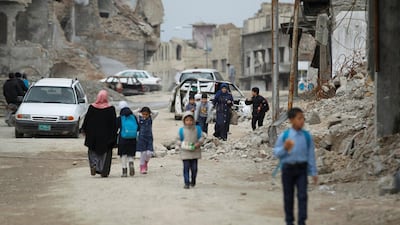The abduction and rape of a three-year-old girl in Mosul has sparked outrage among residents and local officials, who have called it the biggest crime in the northern Iraqi city’s history.
Three-year-old Noor is among thousands of Iraqi children suffering after ISIS’s brutal rule in the city, which ended in July 2017.
On Sunday a man with a bag of sweets abducted Noor outside her family home.
“Noor was standing outside her house when she was approached by a man carrying a bag of candy," Mosul police officer Col Mazen Abdullah said.
"He then dragged her to an abandoned house near her neighbourhood in Mosul. He tied her hands and then committed the crime."
The perpetrator is a 39-year-old man who is married with three children, Col Abdullah said.
He was arrested an hour and half after committing the crime and later confessed.
Noor’s family have demanded his public execution at the scene of crime.
The police preparing to refer the culprit to Iraq’s Criminal Court.
“If our demands are not met, we will retaliate,” said Jamil Khalif, Noor’s grandfather.
Her attacker told police that he did not live in the neighbourhood and moved to Mosul after the city's liberation in July 2017.
Noor was admitted to hospital and has had two operations to save her life.
Mosul, on the west bank of the Tigris, was left in ruins after the three-year occupation of ISIS and the battle led by the Iraqi military to liberate the city.
But with ISIS declared defeated in Iraq in December 2017, attention has shifted to the country’s increase in unemployment and decaying infrastructure.
Abuse against children in Iraq has become widespread, especially in the past few years, the Iraqi Human Rights Committee says.
Although the fighting has largely stopped, 80 per cent of all Iraqi children continue to experience violence at home or in school, Zeina Awad, Iraqi spokeswoman for the UN children's agency, told The National.
"Across the country hundreds of thousands of children, including internally displaced children and refugee children, need protection from and services that respond to violence, exploitation, abuse and neglect," Ms Awad said.
The needs are greatest in areas that have recently seen extreme violence, she said.
Ms Awad said the UN agency was calling on Iraqi authorities to invest "more effectively into education and other essential services that will benefit Iraqi children and help them to build a brighter future for themselves and for their country".
The UN Population Fund said the risk of sexual exploitation and abuse in Iraq increased during times of crisis.
Community protection is disrupted when populations are displaced, and the breakdown of law enforcement enables perpetrators to abuse with impunity, the fund said in a report.


